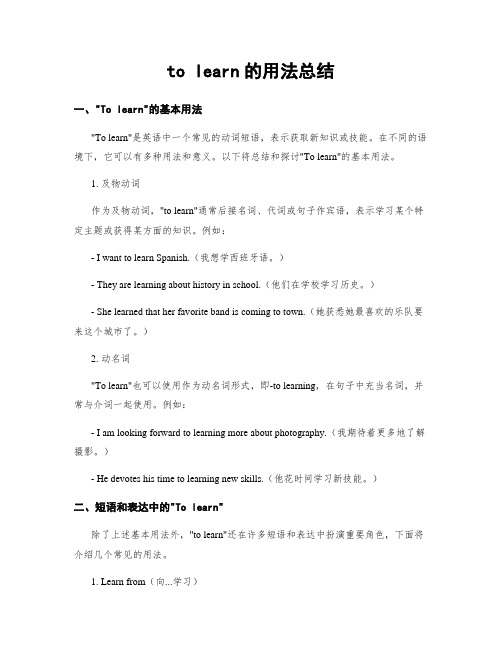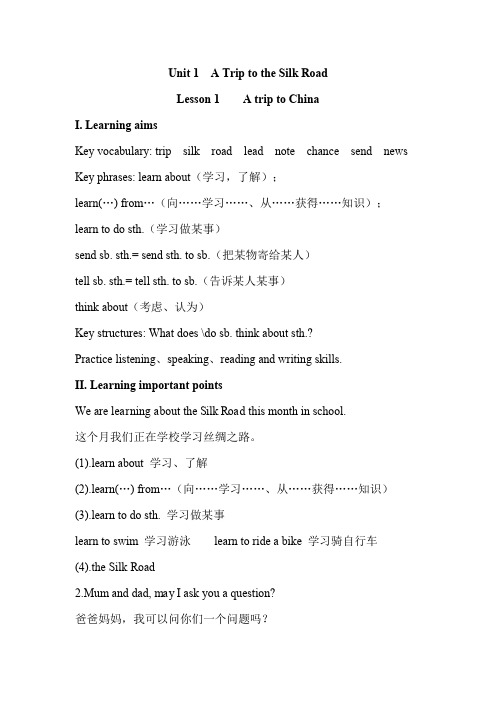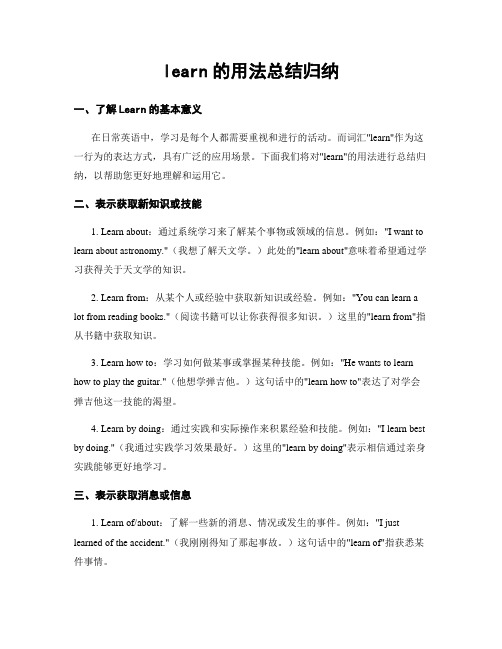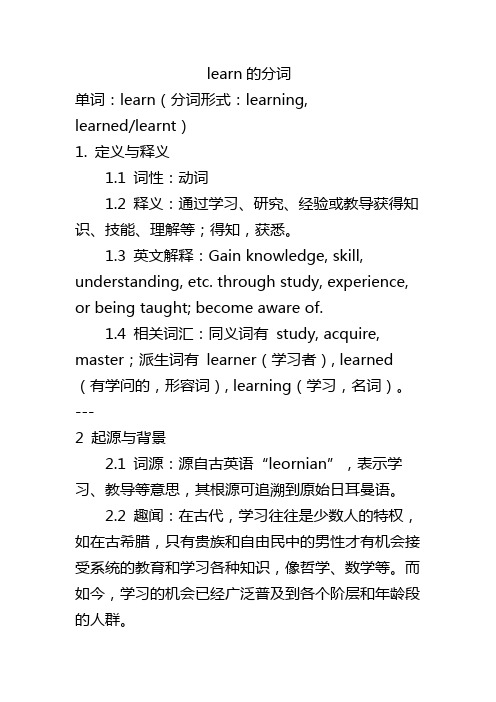learn about 了解
to learn的用法总结

to learn的用法总结一、"To learn"的基本用法"To learn"是英语中一个常见的动词短语,表示获取新知识或技能。
在不同的语境下,它可以有多种用法和意义。
以下将总结和探讨"To learn"的基本用法。
1. 及物动词作为及物动词,"to learn"通常后接名词、代词或句子作宾语,表示学习某个特定主题或获得某方面的知识。
例如:- I want to learn Spanish.(我想学西班牙语。
)- They are learning about history in school.(他们在学校学习历史。
)- She learned that her favorite band is coming to town.(她获悉她最喜欢的乐队要来这个城市了。
)2. 动名词"To learn"也可以使用作为动名词形式,即-to learning,在句子中充当名词,并常与介词一起使用。
例如:- I am looking forward to learning more about photography.(我期待着更多地了解摄影。
)- He devotes his time to learning new skills.(他花时间学习新技能。
)二、短语和表达中的"To learn"除了上述基本用法外,"to learn"还在许多短语和表达中扮演重要角色,下面将介绍几个常见的用法。
1. Learn from(向...学习)这个结构表示从别人或经历中吸取教训或获得知识。
例如:- We can learn a lot from successful entrepreneurs.(我们可以从成功的企业家身上学到很多东西。
)- The team learned from their mistakes and improved their performance.(团队从自身的错误中汲取教训,提高了表现。
【冀教版】七年级英语下册:Unit 1 A Trip to the Silk Road全单元教案

Unit 1 A Trip to the Silk RoadLesson 1 A trip to ChinaI. Learning aimsKey vocabulary: trip silk road lead note chance send news Key phrases: learn about(学习,了解);learn(…) from…(向……学习……、从……获得……知识);learn to do sth.(学习做某事)send sb. sth.= send sth. to sb.(把某物寄给某人)tell sb. sth.= tell sth. to sb.(告诉某人某事)think about(考虑、认为)Key structures: What does \do sb. think about sth.?Practice listening、speaking、reading and writing skills.II. Learning important pointsWe are learning about the Silk Road this month in school.这个月我们正在学校学习丝绸之路。
(1).learn about 学习、了解(2).learn(…) from…(向……学习……、从……获得……知识)(3).learn to do sth. 学习做某事learn to swim 学习游泳learn to ride a bike 学习骑自行车(4).the Silk Road2.Mum and dad, may I ask you a question?爸爸妈妈,我可以问你们一个问题吗?May I…? 此句式表达有礼貌地请求对方允许,语气十分委婉,还可以表达为:Could I \ Can I?其肯定回答常用:Yes.可以。
\ Sure.\ Certainly.当然可以。
learn 的用法

learn 的用法一、学习"learn"的基本用法"Learn"是一个英语动词,意为学习、获得知识或技能。
在句子中,"learn"常用于表示个人通过研究、实践或经历等方式获得新知识或技能。
下面将详细介绍"learn"的几种基本用法。
1. learn + from + 源头:通过某个来源获取知识例如:I learned a lot from my biology teacher.(我从我的生物老师那里学到了很多知识。
)2. learn + how to + 动词原形:学会如何做某事例如:She learned how to play the guitar by watching online tutorials.(她通过观看在线教程学会了弹吉他。
)3. learn + that + 从句:从特定消息、事件中获取信息例如:I learned that they are getting married next month.(我从消息中得知他们下个月要结婚。
)4. learn + about + 主题/名词:获得关于某个主题或领域的信息例如:We learned about the history of ancient Egypt in our history class.(我们在历史课上学习了古埃及的历史。
)5. learn + by/through + 名词/动名词/代词/介词短语/clause: 通过某种方式学习例如:- She learns by watching others.(她通过观察他人学习。
)- We learn through experience.(我们通过经验学习。
)- They are learning through online courses.(他们正在通过在线课程学习。
)- He learns best by listening to podcasts.(他通过听播客方式最有效地学习。
听力理解常考查的词与句子

听力理解常考查的词与句子1.疑问词:when(问时间),where(问地点),who/whom(问谁),what(问什么),why(问为什么),which(问哪一个),whose(问谁的),how(问如何,怎么样),how long(问多长,多久),how often(问频率),how many(问多少数目),how much(问多少钱,时间等),how old (问多少岁)常见的词汇:probable/probably(可能的),the following statement(以下选项),speakers(说话人),according to根据,conversation谈话,relationship关系2.常考的句型:1)What is the relationship between the speakers?说话人是什么关系?2)What are the speakers talking about?说话人在谈论什么?3)What is the number of…?、、、的号码是?4)Where does the…take place?、、、在哪里发生?5)What is the weather like in London?伦敦的天气怎么样?6)What does…mean?、、、是什么意思?7)Which of the following statement is True/Not true?以下选项那个是正确的/错误的?8)What can we learn from…?我们可以从、、、了解到什么?9)What is the passage mostly about?这篇短文大意是什么?10)How does he go to work?他用什么交通方式去上班?初中英语阅读理解的答题技巧一、细节题的主要提问方式是:(1)Which of the following is right?以下哪个选项是正确的?(2)Which of the following is not mentioned?以下哪个选项没有提及过?(3)Which of the following is Not True in the passage?以下哪个选项在文章中不正确?(4)Choose the right order of this passage.选择文章正确的顺序(5)From this passage we know________二、主旨题常考的词汇与提问方式:1.标题title/headline2.主题(subject)3.中心思想(main idea)4.main purpose主要目的主要提问方式是:(1)The main idea of the passage is__________.(2)The passage mainly tells about__________.(3)What is the main idea of this passage?(4)What is the passage mainly talking about?(5)What does the second paragraph(段落)mainly tell us?(6)Which of the following is the best title for the passage?(7)The writer’s purpose in writing this story is__________.(8)What is the author’s(作者的)main purpose?(9)What is the advice given in the passage?三、推断题常考的词汇与提问方式:1、词汇:infer(推断),imply(暗示),suggest,conclude(推断),learn,intend(意指),mean意思是,describe描述,purpose目的,意图。
learn的用法总结归纳

learn的用法总结归纳一、了解Learn的基本意义在日常英语中,学习是每个人都需要重视和进行的活动。
而词汇"learn"作为这一行为的表达方式,具有广泛的应用场景。
下面我们将对"learn"的用法进行总结归纳,以帮助您更好地理解和运用它。
二、表示获取新知识或技能1. Learn about:通过系统学习来了解某个事物或领域的信息。
例如:"I want to learn about astronomy."(我想了解天文学。
)此处的"learn about"意味着希望通过学习获得关于天文学的知识。
2. Learn from:从某个人或经验中获取新知识或经验。
例如:"You can learn a lot from reading books."(阅读书籍可以让你获得很多知识。
)这里的"learn from"指从书籍中获取知识。
3. Learn how to:学习如何做某事或掌握某种技能。
例如:"He wants to learn how to play the guitar."(他想学弹吉他。
)这句话中的"learn how to"表达了对学会弹吉他这一技能的渴望。
4. Learn by doing:通过实践和实际操作来积累经验和技能。
例如:"I learn best by doing."(我通过实践学习效果最好。
)这里的"learn by doing"表示相信通过亲身实践能够更好地学习。
三、表示获取消息或信息1. Learn of/about:了解一些新的消息、情况或发生的事件。
例如:"I just learned of the accident."(我刚刚得知了那起事故。
)这句话中的"learn of"指获悉某件事情。
about的短语意思及例句

about的短语意思及例句about有大约,关于,到处等意思,能够和about组成短语的词汇有很多,接下来就跟着店铺一起学习下面为大家整理的about的短语吧,希望对你有帮助哦!about的短语1. V+about(介词:关于):皆为及物短语动词argue about/over为…争论/ /辩论bring about带来,造成complain about(抱怨/投诉)ask / inquire about: 询问…的情况care about: 在乎;/介意;关注concern about:关心,挂念discuss about讨论,议论hear about:听说(=hear of)quarrel about/over为…争论/争吵set about doing sth着手做某事talk about:谈论worry about:担心hang about :闲荡move about:四处走,经常搬家wander about:漫步/徘徊debate about /on为/关于…辩论do sth about...想办法/采取措施解决...know/learn about:了解read about:读知,阅后得知speak about:谈到,谈论(=speak of)think about:考虑2.V+about(副词:到处/四周):皆为不及物短语动词come about : 发生look about/around:环顾;(商店中)四处看walk/go about:四处走动about的网络释义About关于; 大约; 掉抢; 大约关于;come about发生; 产生; 造成; (风等)改变方向;see about查看; 照料; 留意; 负责处理(某事);throw about到处扔; 转向航行; 乱丢(东西),乱花(钱); 乱丢;beef about抱怨;about的同义词辨析about, around, round这些词均有"在周围,在附近"之意。
learn的分词

learn的分词单词:learn(分词形式:learning,learned/learnt)1. 定义与释义1.1 词性:动词1.2 释义:通过学习、研究、经验或教导获得知识、技能、理解等;得知,获悉。
1.3 英文解释:Gain knowledge, skill, understanding, etc. through study, experience, or being taught; become aware of.1.4 相关词汇:同义词有study, acquire, master;派生词有learner(学习者), learned (有学问的,形容词), learning(学习,名词)。
---2 起源与背景2.1 词源:源自古英语“leornian”,表示学习、教导等意思,其根源可追溯到原始日耳曼语。
2.2 趣闻:在古代,学习往往是少数人的特权,如在古希腊,只有贵族和自由民中的男性才有机会接受系统的教育和学习各种知识,像哲学、数学等。
而如今,学习的机会已经广泛普及到各个阶层和年龄段的人群。
---3 常用搭配与短语3.1 短语:- learn from:向……学习。
例句:We should learn from our mistakes. 翻译:我们应该从错误中学习。
- learn about:了解,得知。
例句:I want to learn about different cultures. 翻译:我想要了解不同的文化。
- learn by heart:牢记,背诵。
例句:The students are learning the poem by heart. 翻译:学生们正在背诵这首诗。
---4 实用片段(1). “I'm learning to play the guitar. It's really challenging but fun.” said Tom. 翻译:“我正在学弹吉他。
常见英语固定词组搭配

12、give on 朝向,向着give proof on举例证明give knowledge on就…提出建议13、give up on 放弃;对…表示绝望;对…不再期待14、give me a hand 帮我一下【go】go ahead开始;前进;先走;干吧go up上升;上涨;增长;建起go on 继续;过去;继续下去;发生go on with继续;进行;暂时使用go on well with 与某人相处融洽=get on withgo in参加;(太阳等)被云遮住;放得进go out出去;熄灭;过时go out with和…出去;与某人约会go out of从…出来,离开go away走开go outside外出;往外走go out away from 远离wn下降;平静下来;传下去;被接受go through参加;经受;仔细检查;被通过go through from从…..go over复习,重温;仔细检查;转变;润色go by经过;顺便走访;凭…判断go from 从…处出发go back from违背;食言【hand】Hand out 分发;施舍;把…拿出来hand over 交出;移交hand off不可触摩;切换,转换hand up举手;呈交上级hand in 交上;提交;呈送in hand adv. 在手头;在进行中;在控制中out of hand 无法控制;脱手,告终;立即hand on 转交;传递下去on hand 在手边;在场;即将发生at hand adv. 在手边;即将到来hold hands 手拉手hand in hand 手拉手地;联合by hand adv. 用手on the one hand…on the other hand 一方面……另一方面……shake hands 握手helping hand 援助之手;援手;帮手in your hand 在你的手里with both hands 全力以赴地right hand 右手;得力助手take leave 向…告别,告辞leave room for 留下…的余地;为…留余地;留出空间ask for leave 请假【let】let out放掉;发出;放走;放出let alone更不用说;更别提;不干涉;不打扰let go放开;展翅高飞;放手;释放let down使失望;降低;放低;放衣服let loose放开;放松;放出;释放let down使失望;放下let in放进;让...进入;进入;……let go 放开;释放;发射let go of 释放,松手放开let out v. 放出;泄露;出租let's say 比如说(用作插入语)let down 使失望;放下;辜负;减速下降let off 放出;准许…暂停工作;宽恕let in 让…进来;嵌入【Look 】1. look about /around(1) 环顾四周The chief kept looking about.小偷不停地环顾四周。
